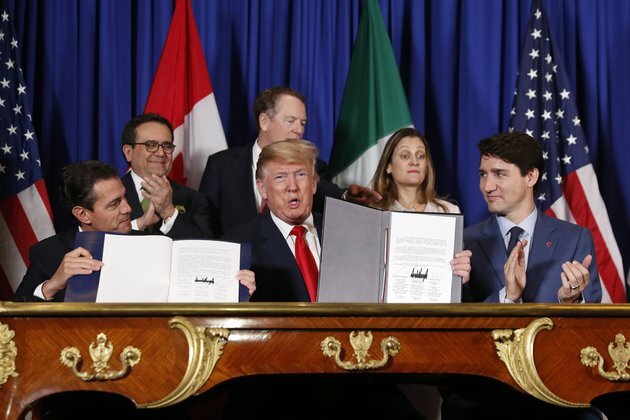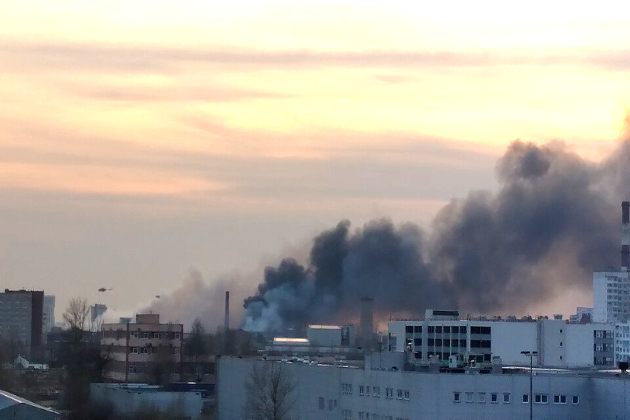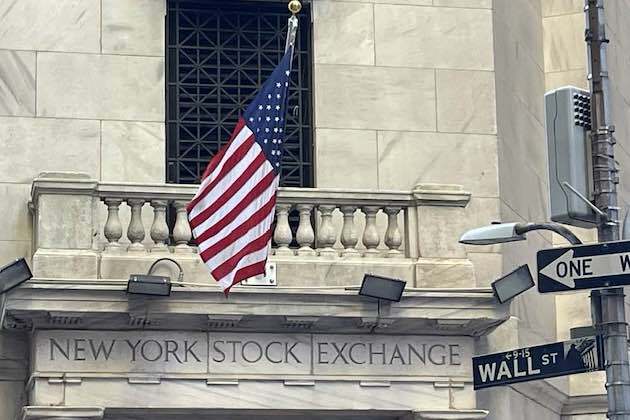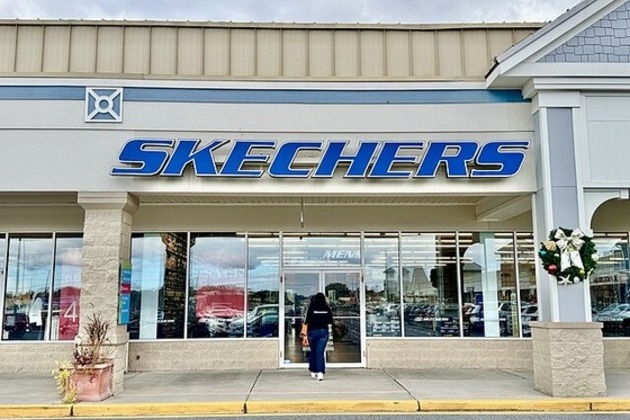USMCA: The 3 most important changes in the new NAFTA and why they matter
The Conversation
11 Dec 2019, 23:54 GMT+10

President Donald Trump and Democratic leaders agreed on a deal to pass a new trade agreement between the U.S., Mexico and Canada that will update NAFTA.
Passing the new trade accord, known as the U.S.-Mexico-Canada Agreement, would be a substantial win for both Trump - given it's one of his campaign promises - and Democrats, who want to show they're legislating even as they prepare to impeach the president.
So how is the USMCA different from the North American Free Trade Agreement, and why should you care?
Although the final revised text of the USMCA has not yet been released, the deal as detailed in May contains numerous tweaks from its predecessor, both big and small. As an agriculture economist who studies trade, I believe three changes are especially noteworthy.
Please pass the butter
Since 1994, the U.S. and Canada have dropped tariffs and other trade restrictions on most agricultural products. But there were a few exceptions, most notably dairy.
Dairy was a particularly problematic sticking point in year-long negotiations between the three countries. The U.S. and Canada both have long histories of protectionist policies, such as subsidizing dairy farmers and setting import quotas on milk. Canadian tariffs on some products can be as high as 300%.
The new USMCA begins to change that, representing a small but important win for both countries, especially the U.S.
Under the new accord, Canada will curb some of the ways it protects its dairy industry, such as allowing more American milk, butter, cheese and other dairy products to enter Canada duty-free, with reciprocal treatment for Canadian dairy exports to the U.S.
Made in North America
The new agreement also made big changes for auto manufacturers in hopes of ensuring more vehicles and parts are made in North America.
Starting as early as 2020, to qualify for zero tariffs when crossing borders, a car or truck must have 75% of its components manufactured in Canada, the U.S. or Mexico, up from 62.5% currently.
Even more noteworthy, negotiators agreed to a new requirement that 40% to 45% of a vehicle's components must be made by workers earning at least US$16 per hour, which is about three times more than the average wage currently earned by Mexican auto workers.
This change is huge, particularly for low-paid workers in Mexico. But it may lead to challenges over the enforcement of labor laws and increase the cost of cars made in all three countries.
Keeping up with the times
Society has experienced significant technological changes since NAFTA was implemented in 1994. Back then, the internet was still in its infancy, while smartphones and self-driving cars were barely imaginable.
That's why modernization - updating rules and standards to keep up with the times - is a critical and positive update to the trade deal tying the North American continent together.
While NAFTA was the first trade treaty to include intellectual property protections, the high pace of innovation has made modernization of its provisions imperative.
The new agreement includes stronger protections for patents and trademarks in areas such as biotech, financial services and domain names - all of which have advanced considerably over the past quarter-century. It also contains new provisions governing the expansion of digital trade and investment in innovative products and services.
Separately, negotiators agreed to update labor and environmental standards, which were not central to the 1994 accord and are now typical in modern trade agreements. Examples include enforcing a minimum wage for autoworkers, stricter environmental standards for Mexican trucks and new rules on fishing to protect marine life.
Apart from the changes, there is one important thing about the original NAFTA that will stay, thanks to the insistence of Canada. Chapter 19 is the dispute settlement mechanism that allows countries to seek remedies for breaking the rules. It's like "trade court" and makes it much easier to challenge another country's policies.
Although Mexico's Senate ratified the USMCA earlier this year, the deal still needed approval from Canada and the U.S. Congress. Democrats and labor unions insisted on revisions to the text to address enforcement of labor and environmental provisions and intellectual property protection. The newly revised text agreed to by Trump and the Democrats addresses these issues and is now ready for approval by all three countries.
All in all, I believe the new NAFTA is definitely a modern and updated version of its important predecessor, which the U.S. Department of Agriculture characterized as one of the most successful trade agreements in history.
This is an updated version of an article originally published on Oct. 2, 2018.
[ Like what you've read? Want more? Sign up for The Conversation's daily newsletter. ]
Author: Amanda M. Countryman - Associate Professor of Agricultural Economics, Colorado State University 
 Share
Share
 Tweet
Tweet
 Share
Share
 Flip
Flip
 Email
Email
Watch latest videos
Subscribe and Follow
Get a daily dose of Las Vegas Herald news through our daily email, its complimentary and keeps you fully up to date with world and business news as well.
News RELEASES
Publish news of your business, community or sports group, personnel appointments, major event and more by submitting a news release to Las Vegas Herald.
More InformationInternational
SectionCritics warn Erdogan’s plan may extend rule beyond 2028
ANKARA, Turkey: Turkish President Recep Tayyip Erdogan said this week that he has appointed a group of legal experts to begin drafting...
Chemical plant blast in eastern China kills 5, injures 19; 6 missing
BEIJING, China: Six people are still missing and rescue teams continued their search on May 28 after a powerful explosion at a chemical...
Rio beach rules to change starting June 1, says mayor
RIO DE JANEIRO, Brazil: Starting June 1, Rio de Janeiro's Mayor Eduardo Paes has issued a new set of rules for the city's beaches that...
US scraps CDC COVID shots for healthy children, expecting mothers
WASHINGTON, D.C.: In a significant shift to federal vaccine guidance, the U.S. government will no longer recommend routine COVID-19...
Xenon gas treatment helps climbers reach Everest faster and cleaner
KATHMANDU, Nepal: Using xenon gas treatment and new technology is making climbing Mount Everest faster and better for the environment...
Egypt unveils ancient tombs of New Kingdom officials in Luxor
CAIRO, Egypt: Egypt has revealed three newly discovered tombs in the Dra Abu al-Naga necropolis in Luxor. These tombs, found by Egyptian...
Business
SectionTexas bill targets app store access for minors, awaits governor’s nod
SAN FRANCISCO, California: Texas is set to become the first major U.S. state to require Apple and Google to verify the age of users...
US optimism rises after tariff pause, survey shows
WASHINGTON, D.C.: After months of steady decline, U.S. consumer confidence saw a significant rebound in May—buoyed in part by a temporary...
U.S. stocks end day, week, month with mixed performances
NEW YORK, New York - Uncertainty over trade tariffs kept invetsors and tradersv at bay on Friday with the major indices finishing mixed....
Skechers deal sparks wave of take-private talks amid trade turmoil
NEW YORK CITY, New York: As trade policy uncertainty rattles markets and slashes valuations, a growing number of U.S. retailers are...
Volvo cuts 3,000 jobs amid trade tensions and economic uncertainty
FRANKFURT, Germany: Volvo Cars, based in Sweden, is cutting 3,000 jobs to reduce costs as the automobile industry struggles with trade...
Amid losses, Nissan bets on e-Power hybrid to revive US sales
YOKOSUKA, Japan: Facing mounting losses and global restructuring, Japan's Nissan Motor Corp. is turning to its unique e-Power hybrid...












